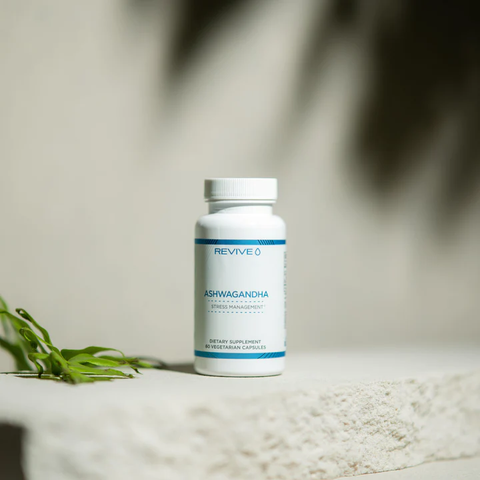Is Ashwagandha Bad for Your Liver? The Truth
In a world where we are always looking for healthy options and supplements to keep our bodies running optimally, it is important to be aware of the risks that some of these natural supplements have. Ashwagandha is a popular herbal supplement and while it has a lot of great benefits, there are also some concerns about the safety of using this herb, especially how it may have adverse effects on your liver.
Is Ashwagandha bad for the liver? It very well could be, especially with excessive use and high doses. While it does have many benefits, determining whether the benefits outweigh the risks is absolutely essential and you may need to consult with your health care provider before you make a final decision on this particular herbal remedy. Below, we share some more information on liver health and how ashwagandha supplements may affect that. Keep reading to learn more!

About Ashwagandha
Ashwagandha is an herb that comes from an evergreen shrub. The plant is primarily found in parts of Asia and Northern Africa. It’s well known for being a medicinal herb that is used for Ayurvedic medicine. While that is one of the most common properties, it is used in many other things as well. You can find it in various supplements, take it as a vitamin, and even find it in things like protein shakes.
The scientific name of this plant is withania somnifera and it heralds back to ancient uses. This particular category of herbs is known as adaptogen. As the name suggests, ashwagandha can help your body adapt to life and stressful events, helping your body promote overall health even when you are facing health-challenging hard times.
The “chemicals” in ashwagandha reduce inflammation, calm you down, benefit your immune system, and help lower blood pressure as well. All of these benefits help you face stress and will allow your mind and your body to better handle the stress as well. This is one of the most widespread medicinal herbs, particularly in Western culture. It’s said that the herbal supplement helps with some of these conditions too:
- Anxiety
- Aging
- Insomnia
- Reduce blood sugar
- Immune health
- Reproductive health
Just like with any natural herb or supplement, there are risks and downsides to using them. You should be aware of both sides so that you can make an informed decision. If you have concerns or you are prone to liver disease or liver damage, you definitely should consult with your doctor before using this supplement.

The Benefits of Ashwagandha
If you research ashwagandha root extract, you will quickly find an extensive list of benefits. Remember that it’s a common herbal medicine in Western culture and using it for medicinal purposes dates back for centuries. There are many representative benefits, but the problem is there are very few human studies or animal studies that denote the benefits as well as the risks. The information is not fully supported, it’s more just passed down by centuries of practice and the knowledge of Ayurvedic medicine.
Does this mean it doesn’t work? Absolutely not. The effects of ashwagandha work well for many things. It simply means there isn’t a lot of science or data to back the claims of this herb. That being said, as much as it has been used, people have had the opportunity to learn and discover. It clearly works for physical performance and other benefits for many people or it wouldn’t still be so popular and heavily used as well.
These are some of the potential health benefits you can experience:
- Stress reduction
- Immune function
- Anti-inflammatory
- Cognitive function
- Weight loss
Stress Reduction
We mentioned this earlier in our guide, but one of the most well-known benefits of ashwagandha is to help relieve stress. It’s a calming herb. The benefits of relieving stress have many advantages for your mind, body, and general health. The truth is that we wreak havoc on our bodies with high stress and anxiety and many of us suffer from these things.
When we can calm our minds from anxiety and the harm that stress hormones cause our bodies, we can relieve things like inflammation, high blood pressure, and other health issues with natural approaches. Did you know that anxiety affects nearly 30% of adults? It is the most common mental health challenge that we face today.
Most of our anxiety symptoms come from stressful lives and other things going on in the world. The anxiety levels continue to grow at an alarming rate. If we can find natural solutions to calm our minds and improve our overall health, it can greatly reduce anxiety.

Immune System Boost
Our immune systems get hit hard with life. They are constantly subjected to new illnesses, new viruses, and new strains of something or other. Our bodies fight hard to build up immunity so that we don’t have to spend our entire lives sick with whatever we catch next. But it’s a hard job to keep us healthy all the time.
Ashwagandha root extract has been said to help boost the functionality of your immune system. This means that your immune system can work more effectively and help prevent illness and infections for you much better. The herb gives your immune system a boost so that it can continue to keep you healthy.
Anti-Inflammatory
Another benefit of ashwagandha root extract is its anti-inflammatory properties. Our bodies face inflammation as a fight against stress, oxidative stress, lifestyle, and more. It’s a defense response from our bodies, but inflammation causes a lot of health issues. Because of the calming properties and antioxidant nature of ashwagandha, it helps to reduce inflammation that your body may experience.
Cognitive Function
The studies on cognitive function and ashwagandha are still very new and very limited. However, there is some evidence so far that suggests this herb could support and improve your cognitive function. Many feel as though ashwagandha could help treat mental cognitive issues, including some of the diseases that have no official cure as of yet. While it is not being claimed as a cure, the research shows that it may help reduce symptoms and support your memory and cognitive function.
Again, there is still very limited information on this, but it’s certainly worth looking into more. It will take some time still before scientists are ready to say with any real certainty if this could help something like dementia or Alzheimer’s, but it appears to be a strong consideration with a little bit of thought behind it. The stress reduction and calming benefits seem to support mental health in many ways.
Weight Loss
Ashwagandha root extract helps to lower your blood sugars and your triglycerides too. With these supports from the herb, it can easily be used to support weight loss. Now, it’s not a magical weight loss pill, but the benefits of supporting glucose levels and blood sugar will help to prevent type 2 diabetes and certainly can support weight loss efforts in the process.
There have been some studies looking at ashwagandha for weight management. In the studies that have been completed so far, it is thought that it can promote healthy weight loss and improve your process of working to reduce body weight and BMI.
Is Ashwagandha Bad for the Liver? Risks and Concerns
While the herbal supplement ashwagandha has so many great benefits, there are also risks. Being familiar with the risks is imperative. For example, while the benefits are good, it doesn’t mean that every person should run out and start using ashwagandha supplements. The truth is that while it might be great for some people, it may do more harm to others. Many of the clinical studies conducted so far report positive results for the things that they are testing. These clinical trials also report some concerning information about ashwagandha-induced liver toxicity.
Does that mean no one can use ashwagandha because it might harm their liver? No. It simply means that people should be aware so that they can weigh the risks and make a fully informed decision about whether it is good or bad for their situation. It’s also a good idea to work closely with your healthcare provider so you can consider the total picture. It is a supplement, which means it may not be the right option for your health needs.
One of the biggest concerns about the herb is ashwagandha-induced liver injury. Again, these don’t necessarily affect everyone, but someone more prone to liver issues would be at a substantially higher risk. The concerns that have come forward are primarily from individual cases in which a person taking this herb then suffered an acute liver injury or some sort of liver damage. This damage and concern does not apply to every user.
In general, despite the risks of drug-induced liver injury, the dietary supplement is considered to be overall safe when appropriate dosages are followed. In general, systematic review and meta-analysis of the safety profile of this herb don’t reveal significant liver effects on a large scale.
The concern for ashwagandha extract and your liver is that it may be toxic to at-risk livers. Ensuring you stay in the proper dosage range will go a long way to prevent these issues. Understanding your liver health also goes a long way.
There are some other possible side effects to be familiar with as well. Those include the following:
- Dry mouth
- Digestive irritation
- Gastrointestinal discomfort
- Drowsiness
- Nausea
- Low blood pressure
- Hyperthyroidism aggravation
Being aware of the risks and potential side effects allows you to be prepared and in the know. If you experience discomfort or have concerns, you should cease taking the supplement and speak with your doctor.
Safe Use of Ashwagandha
Using any dietary supplements safely is absolutely critical. If you take too much, that is when it is most likely to become harmful. You should be aware if it is an ingredient in anything that you consume or use regularly, especially if you plan to add a supplement.
Some of the things you should keep in mind are dosage, the quality of the supplement, your sensitivity, and working with your healthcare provider.

Conclusion
Is Ashwagandha bad for the liver? It can be. It is important to be aware of the risks and consult with your healthcare provider before you start using a supplement. If you are at risk of poor liver health, it may be best to avoid the use of this supplement. Otherwise, it is considered generally healthy to use and does have several great benefits. Just be aware and informed before you use it.
Explore our carefully formulated liver support supplements to maintain optimal liver health and overall wellness today!
The information being presented in this blog is intended to be used as educational or resource information only. It is not intended to be a substitute for medical advice from your healthcare provider. This content should not be used for the diagnosis or treatment of any medical condition. If you have any questions or concerns about your health, please contact your healthcare provider. You should call 911 for all medical emergencies. Revive MD is not liable for any advice or information provided on this blog, which advice or information is provided on an “as-is” basis, and assumes no liability for diagnosis, treatment, decisions, or actions made in reliance upon any advice or information contained on this blog. No warranties, express or implied, are made on the information that is provided.
The information being presented in this blog is intended to be used as educational or resource information only. It is not intended to be a substitute for medical advice from your healthcare provider. This content should not be used for the diagnosis or treatment of any medical condition. If you have any questions or concerns about your health, please contact your healthcare provider. You should call 911 for all medical emergencies. Revive MD is not liable for any advice or information provided on this blog, which advice or information is provided on an “as-is” basis, and assumes no liability for diagnosis, treatment, decisions, or actions made in reliance upon any advice or information contained on this blog. No warranties, express or implied, are made on the information that is provided.





 Liver & Detox Support
Liver & Detox Support
 Gut & Digestive Health
Gut & Digestive Health
 Hormones, Stress & Metabolism
Hormones, Stress & Metabolism
 Sleep & Relaxation
Sleep & Relaxation
 Heart, Brain & Immune Health
Heart, Brain & Immune Health
